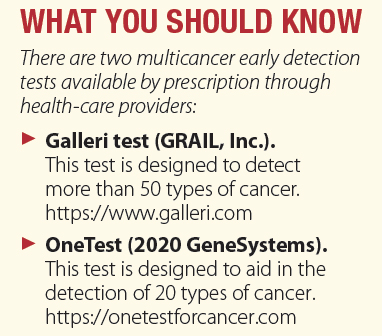Consider the Pros and Cons of Multicancer Early Detection Tests
Approximately 70 percent of cancer-related deaths stem from cancers without established screening tests, according to the American Cancer Society. These cancers frequently elude detection until they reach advanced stages, complicating treatment efforts. Given that the majority of cancers lack established routine screening methods, multi-cancer early detection (MCED) tests are being developed to help find cancer sooner.
MCED tests use a blood sample to analyze DNA fragments. They have the potential to detect a broad spectrum of cancers, ideally prior to the onset of symptoms. Several MCED tests are in development, with at least two already accessible with a doctor’s prescription—the Grail, made by Galleri, and OneTest, made by 2020 GeneSystems.
MCED Complements Screening
MCED tests are not meant to replace screening tests, such as mammograms for breast cancer or Pap tests for cervical cancer. Instead, MCED tests are meant to be used in conjunction with current screening tests. “These tests look for potential signs of cancer detectable in the blood. If such indicators are present, further evaluation would be needed to investigate what sort of cancer might be present and how best to look for it,” explains John P. Leonard, MD, hematology and oncology specialist at Weill Cornell Medicine.

Advantages of MCED Tests
There are many advantages associated with MCED tests, including:
Reduced invasiveness: Blood-based MCED tests are less invasive than traditional screening methods like colonoscopies or biopsies, making them more comfortable and accessible.
Personalized medicine: MCED tests may provide insights into the genetic profile of a patient’s cancer. This may be relevant to women who have a BRCA 1 or BRCA 2 gene.
Supplementary screening: MCED tests can complement existing screening methods, aiding in the detection of cancers for which there are currently no established screening protocols.
Psychological Relief: For individuals at high risk or with a family history of cancer, MCED tests may offer peace of mind by providing regular surveillance and early detection.
Early Detection: By identifying cancer at an earlier stage, MCED tests may help people seek timely intervention and treatment.
Disadvantage of MCED Tests
There’s a down side to MCED tests, as well. Some of these issues include:
False Positives: MCED tests may produce false-positive results, indicating the presence of cancer when there is none. This can lead to unnecessary anxiety, further invasive testing, and potentially harmful interventions.
False Negatives: MCED tests may yield false-negative results, failing to detect cancer that is actually present. This could result in delayed diagnosis and treatment, potentially compromising patient outcomes. For example, the Galleri test has a 0.5 percent false-positive rate, meaning 1 in 200 people who do not have cancer will receive a “Cancer Signal Detected” result.
Lack of Specificity: Some MCED tests may lack specificity, meaning they may detect cancer markers that are not indicative of malignancy or are present in benign conditions, which can lead to unnecessary follow-up tests and interventions.
Cost: MCED tests may be costly— and rarely covered by insurance—making them inaccessible to many.
Psychological Impact: False-positive results or the detection of early-stage cancers may cause psychological distress and anxiety in patients, impacting emotional well-being.
Limited Evidence: Many MCED tests are still in the developmental stage, with limited clinical evidence supporting their accuracy, efficacy, and long-term impact on patient outcomes. “Many questions about these concerns are currently being evaluated in large studies,” says Dr. Leonard.
High Risk and MCED Tests
Should people who are at a high risk of a particular cancer consider an MCED test? Maybe. “Those with risk factors for cancer—such as family history—might consider an MCED test. However, given the pros, cons, and current limitations, it’s important to thoroughly review the individual situation with one’s health-care provider,” says Dr. Leonard. MCEDs represent a major step forward, but much more needs to be learned before these tests can be recommended for widespread use.
The post Consider the Pros and Cons of Multicancer Early Detection Tests appeared first on University Health News.
Read Original Article: Consider the Pros and Cons of Multicancer Early Detection Tests »

